#StolenMemory in Poland
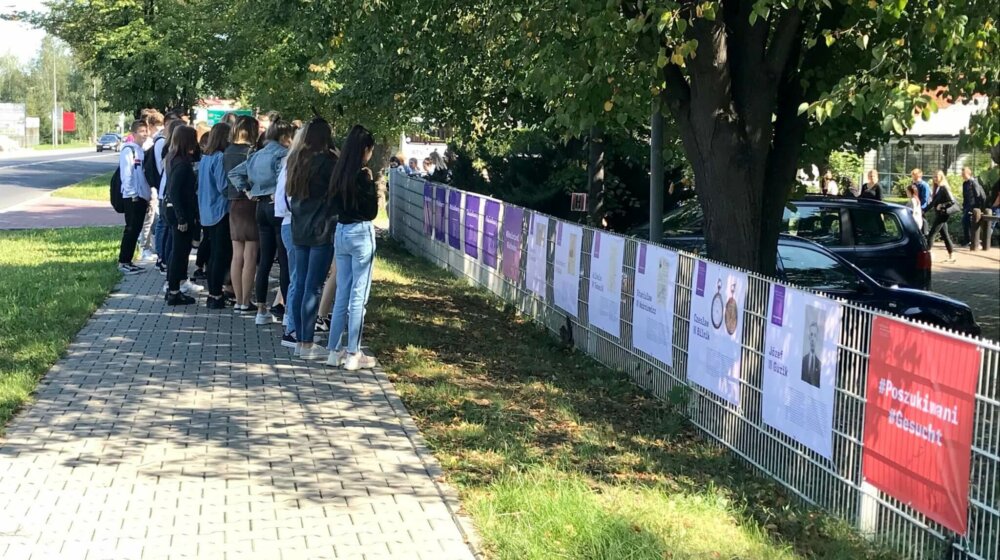
To mark the 80th anniversary of the invasion of Poland and the outbreak of the Second World War, the Arolsen Archives have entered into cooperations with various partners to hold three #StolenMemory exhibitions in Poland, all of which opened in September 2019. The exhibition and the program which accompanies it draw attention to National Socialist persecution and to the impact it still has today.
A place of memory
The Krakow Museum chose The Ghetto Heroes Square as the venue for the exhibition which opened on 3 September 2019. This place has a very special history: from 1941-1943 it was part of the Krakow ghetto and it was on this square that the German forces occupying the city gathered the Jewish population together before transporting them to Belzec and Auschwitz-Birkenau extermination camps and murdering them. The #StolenMemory campaign is attracting attention from a large audience here because the square is a magnet for tourists from all over the world. It has a central location between Oskar Schindler’s Factory Museum and the “Pod Orlem” pharmacy. This shop, which was run by Tadeusz Pankiewicz – the only non-Jewish Pole allowed to stay in the ghetto – was a meeting point for the Jews who lived there. Not only were they able to obtain medical supplies, they also used the pharmacy as a place where they could speak freely with one another, where they could keep in touch with the outside world and exchange information gleaned from the underground press.
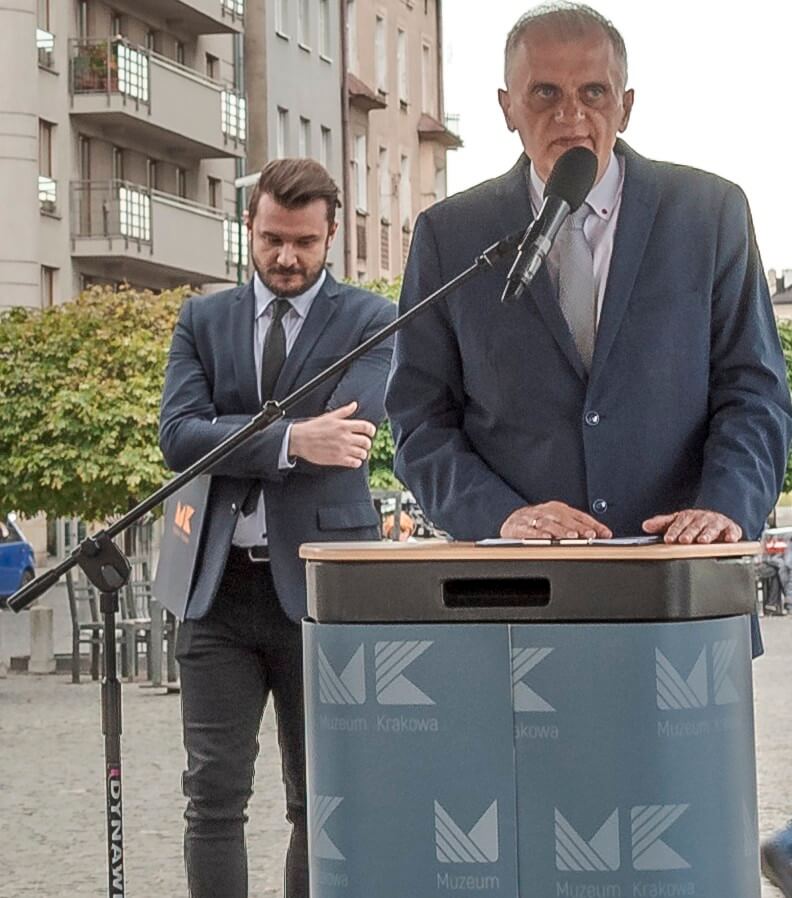
»The exhibition and the return of personal memories to the families of the victims of Nazi persecution is not only important internationally, it is also important for Poland and for Krakow, as it shows the fates of people from this region.«
Jacek Salwiński, Director of the Krakow Museum
The #StolenMemory campaign is designed to include a link to local history in every exhibition. Some of the 32 posters provide information on the fates of people from the region. One of them is Wilhelm Tomasik, who was sent to the Auschwitz concentration camp by the National Socialists on the very first transport. Both his son and his grandson, Ryszard and Robert Tomasik, came to the exhibition opening. They had received Wilhelm’s personal effects – photos and school reports – and information on his path of persecution from the Arolsen Archives. The return of his belongings was an important milestone for the family in helping them to find out more about his fate. Wilhelm Tomasik survived imprisonment in the concentration camp, but he suffered greatly as a result of the horrors he had experienced there and he never spoke about this period in his life.
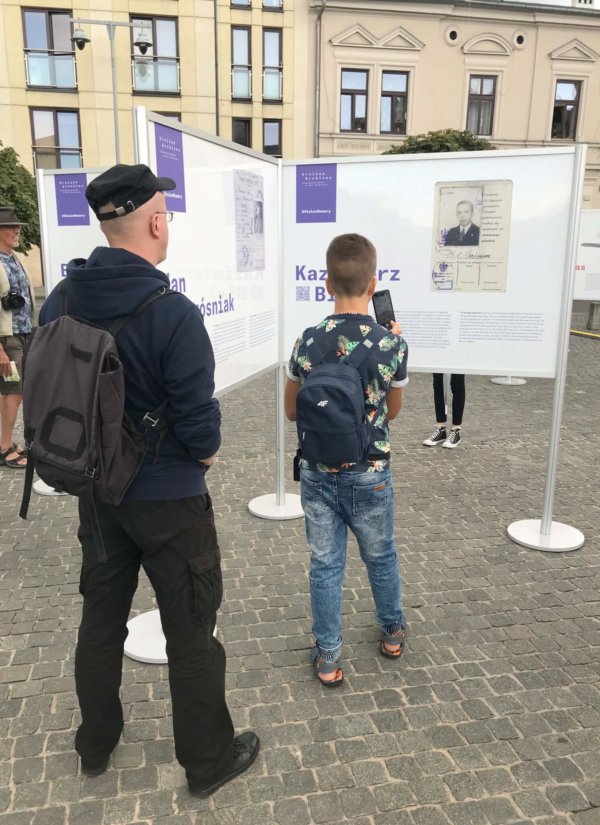
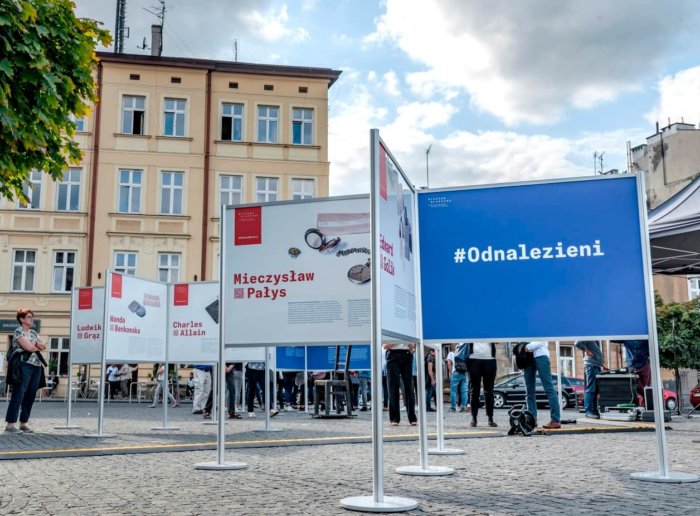
Many people become aware of the #StolenMemory posters on the historical square of the ghetto heroes in Krakow. Today a monument made of chairs reminds of the former purpose of the square: Here the German occupiers gathered the Jewish population before transporting them to concentration camps. The chairs symbolise the pieces of furniture left behind.
The exhibition also includes “Search” posters: people whose relatives have not yet been found. “We hope that the exhibition will make it possible for us to return some of the objects kept in the Arolsen Archives to the families of former prisoners of German National Socialist concentration camps,” says Mateusz Zdeb, the curator of the exhibition.
#StolenMemory as an educational project
Nearly 100 pupils from schools in Oświęcim attended the exhibition opening at the IJBS International Youth Meeting Center in Oświęcim/Auschwitz on 4 September. Cooperation with the International Youth Meeting Center is providing an opportunity to use #StolenMemory as an educational project: the young people involved will attend a number of seminars where they will be able to work with the biographies and the documents, research the fates of people from their own region and look for their traces. Perhaps they will even manage to find more families. The initial results of the search efforts will be presented in March 2020.
After visiting the exhibition together, the young people heard an eye witness account of the fate of one individual: 81-year-old Wanda Różycka-Bilnik spoke about her father Czesław, who is featured on one the “Found” posters. Wanda Bilnik was just four years old when her father was arrested at the family home because he belonged to the Home Army, the Polish underground army, and had looked after wounded partisans together with his wife. The National Socialists deported Czesław Bilnik to the Dachau concentration camp and later to Neuengamme. He died in May 1945 when the Cap Arcona passenger ship was bombed in the Bay of Lübeck. The young people took advantage of the personal encounter and immediately started asking questions: What happened to the partisans? What role did Czesław Bilnik play in supporting the resistance? What exactly did the paratroopers known as the “Cichociemni” (English: the silent unseen) do?
In 2017, Wanda Bilnik had read an article in a Polish newspaper about the Arolsen Archives and about the personal belongings of former concentration camp prisoners still stored there. She got in touch with the Arolsen Archives and found out that they actually had a pocket watch as well as a number of documents. Before the year was out, she traveled to Arolsen to pick them up in person. The watch and the memories of her father have a very special value for Wanda Bilnik and she was able to convey this very clearly to the young people present.
Wanda Różycka-Bilnik reports
Wanda Różycka-Bilnik tells students of Oświęcimer schools what the return of her father's watch meant to her:
“When I read about it, my heart started racing. I was reading a short piece about an organization in Germany that was involved in returning the personal belongings of concentration camp prisoners. Well, my heart started beating very fast. So I made a phone call to Germany and spoke to some very nice ladies. The first lady could not speak Polish so she put me through to a second lady. She could speak Polish well and I told her what I was inquiring about. I could hear her typing while I spoke. I dictated the name Bilnik to her and she said “Yes, we have a name like that here. And we also have a watch!” Well, that was an amazing experience for me. It is such an amazing experience that you have to experience it yourself in order to understand. I will never forget it. Nothing can fill the gap left by a parent.”
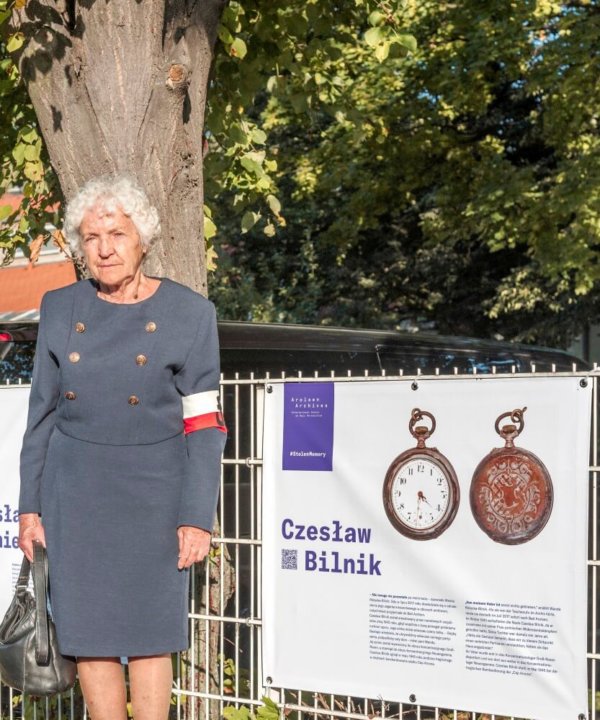
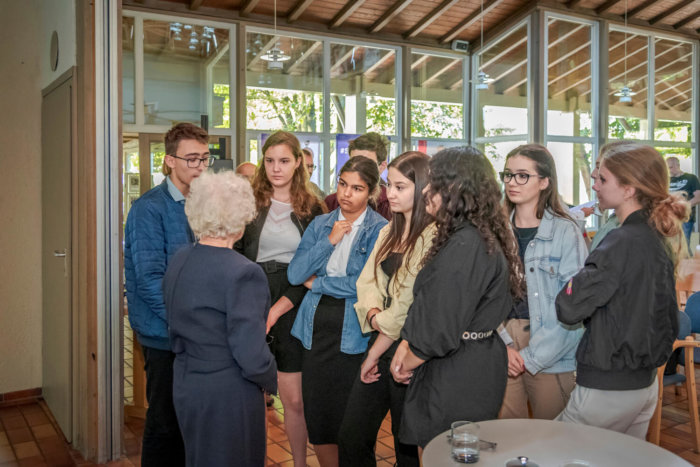
Wanda Różycka-Bilnik tells students in Oświęcim about her father Czesław. He is one of the “found” ones on the posters of the #StolenMemory exhibition. In 2017, Wanda Bilnik personally collected his pocket watch from the Arolsen Archives.
Afterwards, the exhibition was opened to the public: it was attended by many visitors from the town of Oświęcim as well as people who were visiting the Auschwitz-Birkenau memorial and took advantage of the opportunity to look at the poster exhibition and find out about the #StolenMemory campaign. The exhibition is in a public space – the posters hang on the fence which surrounds the International Youth Meeting Center – and is freely accessible to visitors.
Historical forum followed by an educational program
From 9-10 September, the Arolsen Archives took part in the History Forum of the DPJW (the German-Polish Youth Office) in Gdansk. Those invited to attend included memorials and educational institutions from Germany and Poland as well as teachers and others who work in the field of education and organize youth exchanges for young people in Germany and Poland. Anna Meier-Osiński, Head of Tracing, ran a number of workshops where she presented the potential of the #StolenMemory campaign for use in educational contexts. Participants were then given the opportunity to research the fate of a specific person for themselves: they searched the online archive of the Arolsen Archives for documents on Waldemar Rowiński, a 17-year-old Polish student who was deported to the Auschwitz concentration camp by the SS. He died in the bombing of the Cap Arcona passenger ship. Amongst other things, the Arolsen Archives still have his school reports and his student ID card. They also have documents about his imprisonment and the cause of his death. The participants then used this information as the starting point for further research and were amazed by the many connections they found and by the results that emerged in a very short time: “I learned something about the Polish school system along the way” – “Now I know what the Cap Arcona shipwreck was all about” – “I know more about the first transport to the Auschwitz concentration camp now” – these were just some of the reactions.
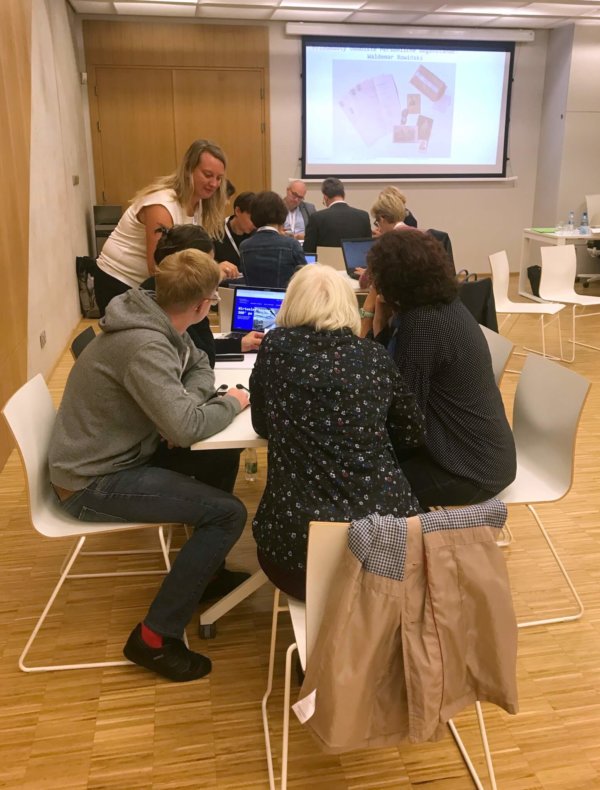
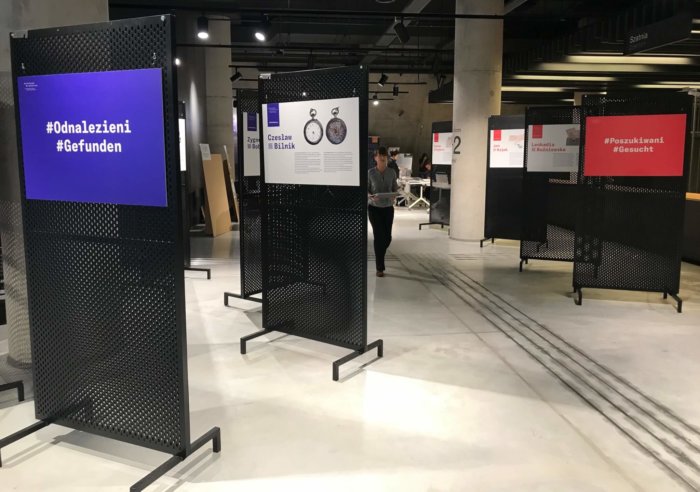
#StolenMemory at the History Forum of the German-Polish Youth Office (DPJW) in Gdansk: Participants from memorial sites and educational institutions as well as teachers from Poland and Germany researched themselves in the online archive of the Arolsen Archives. They were astonished at the points of contact that resulted from the local historical reference.
In 2020, the #StolenMemory campaign will be one of the focal points of the German-Polish projects run by the DPJW. As part of the “Wege zur Erinnerung” (Paths to Remembrance) program, interested teachers and educators can apply for a grant to participate in the project, which will focus primarily on working with biographies and paths of persecution. The kick-off will be a preparatory seminary at the International Youth Meeting Center in Oświęcim/Auschwitz, to be held from 30.01. – 03.02.2020. Anyone who is interested in participating can contact the DPJW directly.

